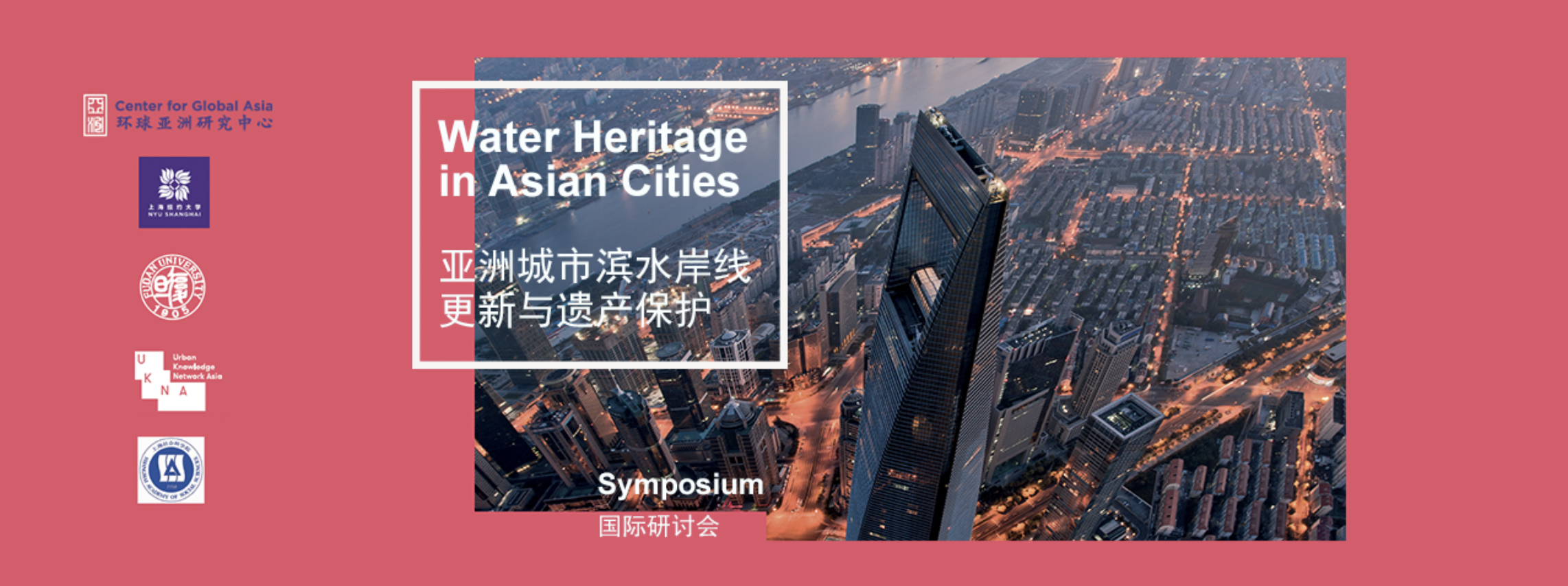CONTACT US
Email: shanghai.cga@nyu.edu
Phone Number: +86 (21) 20595043
WeChat: NYUShanghaiCGA
Address:
Room W822, 567 West Yangsi Road,
Pudong New Area, Shanghai, China

© 2024 All Rights Reserved

Venue: Conference Hall 101, Shanghai Academy of Social Sciences, Shanghai, China
Date: November 29, 2018 to December 1, 2018
Shanghai Academy of Social Sciences
Urban Knowledge Network Asia, International Institute for Asian Studies, Leiden University
Center for Global Asia, New York University Shanghai
Department of Cultural Heritage and Museology, Fudan University
Most cities in Asia are coastal delta cities or cities along major river systems or water bodies. Water has for centuries been the lifeblood of cities across Asia, present in their myths, cultures, societies and religious practices, and as a means of transportation and the backbone of local polities and economies. But current policy discourses on water in cities—in Asia and worldwide—tend to treat water narrowly as a threat and as an element to engineer against and overcome (in the case of floods) or (in the case of scarcity) as a resource to be better managed and regulated.
What is missing in this rather unidimensional and technocratic approach to water is an appreciation of the multiple engagements between human beings and water, in historical context. This requires an understanding of, among others:
This international symposium seeks to contribute to the building of a broader, multi-disciplinary understanding of the role and functions of water in cities in Asia. It considers water—and human engagement with it throughout history—as part of an important heritage of urban life. This heritage is worth examining in detail for its own sake, to help valorize it. But it can also serve to inform water policies in contemporary cities, by enriching concepts such as “resilience” and “adaptation”. If water is part of a socio-ecological system, its challenges and opportunities must be addressed in a multi-disciplinary fashion, connected to social, economic, political as well as ecological considerations.
The symposium is a collaboration between four institutions: Shanghai Academy of Social Sciences (SASS); the Urban Knowledge Network Asia of the International Institute for Asian Studies (IIAS), Leiden University; New York University Shanghai; and Fudan University Department of Cultural Heritage and Museology. The event features four panels, each of which examines a different dimension of urban water heritage in Asia, in relation to ancient as well as contemporary cities. Each panel is organized by one of the organizing institutions.
The NYU Shanghai panel features multi-disciplinary scholarly work on urban water infrastructure in the region to the east of the Tai Lake. Through in-depth case studies about different aspects of the relationship between water and the city, this panel takes stock of existing analyses on the importance of urban water infrastructure in shaping the region’s past, present, and future. Together, the presentations on this panel aim to create synergy in interdisciplinary research on water in this region.
The Fudan University panel explores the diversities of water-based cultural heritage in Asian cities, with a focus of the unique histories and values of these sites in China. The histories of specific heritage sites will be examined, whose values do not only include historic, aesthetic and scientific ones, but also the social benefits in present time, such as pedagogy and local development.
The IIAS/ Urban Knowledge Network Asia panel examines the linked histories of landscapes and waterscapes in several cities across Asia, especially in terms of their non-modern pasts. The panel will focus on the ‘drying out’ and modernization of urban spaces in the Asian context and the varied implications such policies have had on surrounding settlements, wetlands and coastal zones. The growing vulnerability to intense urban flooding, especially in recent decades (Bangkok [2011]; Mumbai [2005]; Jakarta [2013]; Dhaka [1988]), furthermore, urges us to reconsider the complicated relationships between land and flows in the epoch of the Anthropocene.
The Shanghai Academy of Social Sciences (SASS) panel examines waterfront redevelopment as a functional transformation of the city and its relationship with rivers and water bodies. With the evolution of key urban functions, the relationship between cities and their water bodies is also transforming. As the general trend of urban transformations involves a shift away from a singular focus on economic and transportation functions to a more broad-based focus on improvements in quality of life, waterfront redevelopment is becoming the key to the successful transformation of cities and urban water bodies. In this shift, it is not as simple as redeveloping ports and manufacturing sites into green spaces, open spaces, and places for culture or leisure activities—the heritage and cultural identity of the waterfront itself should also be acknowledged. This panel will examine particularly Shanghai’s relationship to the Suzhou Creek and the Huangpu River, in the context of the planning of a massive 140 km long waterfront in the city.
[1] Mathur, A. and Da Cunha, D., 2009. SOAK: Mumbai in an Estuary. Rupa & Company.
[2] Schönach, P., 2017. River histories: a thematic review. Water History, 9 (3), pp. 233-257
Email: shanghai.cga@nyu.edu
Phone Number: +86 (21) 20595043
WeChat: NYUShanghaiCGA
Address:
Room W822, 567 West Yangsi Road,
Pudong New Area, Shanghai, China

© 2024 All Rights Reserved